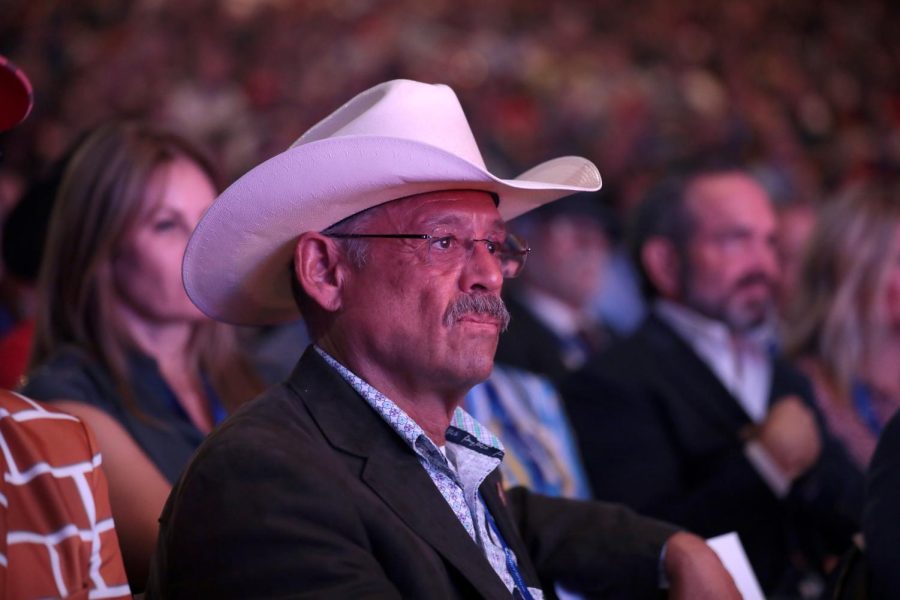In a contentious debate, GOP Secretary of State candidate Mark Finchem, admits to being interviewed by the U.S. Dept. of Justice and Congressional panel investigating the Jan.6 Insurrection
Finchem was in Washington, D.C. on Jan. 6 and took part in the Stop the Steal march to the Capitol—Finchem has reportedly been subpoenaed by the Select Committee to Investigate the Jan.6 Attack on the U.S. Capitol
Mark Finchem at an Arizona event
September 23, 2022
Candidates for Arizona’s office of Secretary of State, Adrian Fontes (D) and Mark Finchem (R) squared off in a debate Thursday night with Finchem, a Trump endorsed candidate— corralling questions around “proof” he had that the 2020 presidential election was invalid.
Finchem, a staunch denier of the 2020 election despite the countless audits that have ultimately served to reaffirm Joe Biden’s win over Donald Trump—continued to veer back to the 2020 election in what could be described as a personal mission.
The GOP candidate was also among those present for the Jan. 6 insurrection march of Stop the Steal—where Finchem said he had a “book of evidence” which he hoped to deliver to “two congressional members of my constitutionally elected congressional caucus.”
However, five days after the events of the Jan 6. insurrection, Finchem released a statement claiming that the evidence book was for former Vice President Mike Pence.
The Republican candidate also revealed Thursday night that he “was interviewed by the Department of Justice as well as the J6 commission, as a witness,”—it has been widely reported that Finchem was also subpoenaed by the Select Committee to Investigate the Jan. 6 Attack on the U.S. Capitol. Finchem has reportedly declined comment on whether he complied with that subpoena.
Finchem circled back to questions surrounding his claims of voter fraud.
“We’ve got the evidence; the media has refused to look at it.” Finchem said.
Both Maricopa and Yuma counties election results, Finchem claimed, were “irredeemable” citing the film ‘2000 Mules’, a “documentary” by conservative commentator Dinesh D’Souza.
That film, much like the audits in Arizona, also failed to provide any “concrete, verifiable evidence of widespread voter fraud in the 2020 election,” Reuters said in an extensive fact-check of the film.
Finchem also touted the website ‘open.ink’ which allegedly houses over “three terabytes of information that speaks to not just video but documentation,” Finchem said Thursday night.
However, the website whose slogan is “freedom of information”, is not freely distributed without requiring users to sign-up in order to access their account—one that requires receiving an email first.
The Washington Post reported in August that once users to this “free” site have access to their account, they are prompted to upgrade from the default subscriber level in order to access more of the site.
In response to Finchem’s claims, Fontes (D) continued to uphold the integrity of the 2020 election and question the integrity of the deniers that continue to question it.
“What we now have is an entire set of fiction that has somehow managed to make a lot of money for some people outside of the regular norms that we expect. This is a chaotic way of re-addressing a political loss.” Fontes said.
Both candidates laid out potential solutions for what they thought would best rectify the voting process in America.
Finchem believes that the federal government should have no business in attempting to reform elections—even though voting is a basic fundamental right of electing federal government officials.
“I think the federal government needs to butt out of states’ rights,” he said. “It is the legislature who names the time, place, and manner of the election not the federal government.”
Fontes responded by citing the United States Constitution.
“I think Article I Section Four of the Constitution of the United States of America would disagree with Mr. Finchem’s assertion about who is charged with the time, place, and manner of elections.”
Article I Section Four of the Constitution states; “The Times, Places and Manner of holding Elections for Senators and Representatives, shall be prescribed in each State by the Legislature thereof; but the Congress may at any time by Law make or alter such Regulations, except as to the Places of choosing Senators.”
As for mail-in-voting, Fontes said that an important part of the Secretary of State’s role is ensuring all voters “have the choice of how they want to vote.”
Fontes accused Finchem of wanting to “kill” mail-in voting, something Finchem has been reportedly critical of in the past.
“Mr. Finchem wants to strip Arizona citizens of their capacity to vote by mail.” Fontes said.
When asked if he wanted to rid Arizonans of mail-in voting, Finchem didn’t specifically respond to the question.
“What I want doesn’t matter,” Finchem said.
Finchem then followed up his response by saying, “I don’t care for mail-in voting. That’s why I go to the polls.”
A large majority of Arizonans prefer the vote by mail because it has proven to be secure and helpful to the voting process.
Ironically, Finchem’s remark is an odd backpedal since mail-in voting was championed by conservatives in Arizona.
Data shows that mail in voting is both widespread and popular in the state with 89% of voters casting ballots by mail in the 2020 general election.
“This is not just an honored tradition in this great state,” Fontes said. “It was created by his party decades ago. It is a secure, accountable, and economical system.”


